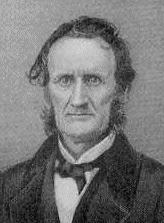Ex parte Milligan facts for kids
Ex parte Milligan was an important case decided by the U.S. Supreme Court. The Court ruled that military courts cannot try regular citizens if the normal civilian courts are still open and working, even during a war. This decision helped protect the rights of citizens.
What Happened in the Case?
Lambdin P. Milligan and four other people were accused of a serious plan during the Civil War. They were said to be planning to steal weapons from the Union army. They also planned to free soldiers from Union prisoner-of-war camps. Their goal was to use these freed soldiers to fight against the government of Indiana. They also wanted to take control of the state governments in Indiana, Ohio, and Michigan.
When their plan was discovered, they were arrested. A military court found them guilty in 1864 and sentenced them to death. However, their execution was not set until May 1865. This gave them time to challenge their case in court after the Civil War ended.
Who Argued the Case?
Many important lawyers argued in this case.
- For the United States government, the argument was made by Benjamin Franklin Butler. He was a lawyer from Massachusetts who later became the Governor of Massachusetts.
- For Lambdin P. Milligan and the others, several lawyers presented their case. These included Jeremiah S. Black, who had been a U.S. Attorney General and Secretary of State. Also arguing for them was James A. Garfield, who would later become a U.S. President. New York lawyer David Dudley Field also helped their case.
The Court's Decision
The Supreme Court made a very clear decision. They ruled that military courts cannot put civilians on trial in places where regular civilian courts are open. This rule applies even when the country is at war.
The Court also said that citizens can only be held by the military without charges for a short time. They cannot be put on trial by military courts. And they certainly cannot be sentenced to death by military courts. This decision was a big win for protecting the rights of citizens during wartime.
 | George Robert Carruthers |
 | Patricia Bath |
 | Jan Ernst Matzeliger |
 | Alexander Miles |


